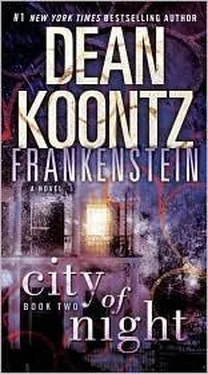Erika frowned. “Shouldn’t I?”
“No. Never.”
“Why not?”
“Mrs. Helios, surely the subject of social deportment was part of your manners-and-etiquette download.”
“Well, I guess it was. I mean, if you think it should have been.”
“It definitely should have been. You shouldn’t discuss your sex life with anyone but Mr. Helios.”
“The thing is, he beat me during sex, even bit me once, and he called me the worst names. I was so ashamed.”
“Mrs. Helios —”
“He’s a good man, a great man, so I must have done something terribly wrong to have made him hurt me, but I don’t know what upset him.”
“You’re doing it again,” Christine said impatiently, “talking about your private life with Mr. Helios.”
“You’re right, I am. But if you could help me understand what I did to displease my husband, that would be good for both me and Victor.”
Christine’s stare was sharp and unwavering. “You do know that you are the fifth Erika, don’t you?”
“Yes. And I’m determined to be the last.”
“Then perhaps you’d better not talk about sex even with him.”
“Even with Victor? But how will I find out why he was displeased with me?”
Christine stropped her sharp stare into an even more piercing gaze. “Maybe he wasn’t displeased.”
“Then why did he punch me and pull my hair and pinch my —”
“You’re doing it again.”
Frustrated, Erika said, “But I’ve got to talk with somebody about it.”
“Then talk to the mirror, Mrs. Helios. That’s the only safe conversation you can have on the subject.”
“How could that be productive? A mirror is an inanimate object. Unless it’s magical, like in Snow White and the Seven Dwarfs .”
“When you’re looking at yourself in the mirror, Mrs. Helios, ask yourself what you know about sexual sadism.”
Erika considered the term. “I don’t think it’s in my programmed knowledge.”
“Then the very best thing you can do is educate yourself… and endure. Now, if that’s everything, I have a number of tasks to attend to.”
The soft rattle of the computer keyboard under Vicky Chou’s nimble fingers, as she composed a letter, was the only sound in the summer afternoon. Each time that she paused in her typing, the subsequent silence seemed nearly as deep as deafness.
The merest breath of sultry air stirred the sheer curtains at the open window but did not produce the faintest whisper. Outside, the day lacked bird songs. If traffic passed in the street, it did so with the muted grace of a ghost ship sailing without wind across a glassy sea.
Vicky Chou worked at home as a medical transcriptionist. Home was Carson O’Connor’s house, where she received free room and board in return for serving as a caregiver to Carson’s brother, Arnie.
Some of her friends thought this was an odd arrangement and that Vicky had negotiated a bad deal. In truth, she felt overcompensated, because Carson had saved Vicky’s sister, Liane, from serving life in prison for a crime she had never committed.
At forty-five, Vicky had been a widow for five years; and as she’d never had children of her own, a fringe benefit of living here was the feeling of being part of a family. Arnie was like a son to her.
Although autistic, the boy rarely presented her with a problem. He was self-absorbed, quiet, and endearing in his way. She prepared his meals, but otherwise he cared for himself.
He seldom left his room, and he never left the house except when Carson wished to take him with her. Even then he usually went only with reluctance.
Vicky didn’t have to worry about him wandering away. When he wandered, it was to internal lands that held more interest for him than did the real world.
Nevertheless, the silence began to seem eerie to her, and an uneasiness crept over her, growing with each pause in her typing.
At last she rose from her desk chair and went to check on Arnie.
Vicky’s second-floor room was a pleasant size, but Arnie’s quarters — across the hall — were twice as large as hers. A wall had been taken down between two bedrooms to provide him with the space that he required and with a small bath of his own.
His bed and nightstand were jammed in a corner. At the foot of his bed stood a TV with DVD player, on a wheeled stand.
The castle occupied a significant part of the room. Four low tables formed an eight-by-twelve-foot platform on which Arnie had erected a Lego-block wonder that was brilliantly conceived and executed in obsessive detail.
From barbican to curtain wall, to casements, to ramparts, to the keep, to the highest turrets, down to the bailey, through the inner ward, to the barracks and the stables and the blacksmith’s shop, the ninety-six-square-foot marvel seemed to be Arnie’s defense against a frightening world.
The boy sat now in the wheeled office chair that he occupied when working on the castle or when just staring dreamily at it. To any eye but Arnie’s, this Lego structure was complete, but he was not satisfied; he worked on it every day, adding to its majesty and improving its defenses.
Although twelve, Arnie looked younger. He was slender and as pale as a Nordic child at the end of a long dark winter.
He did not look up at Vicky. Eye contact dismayed him, and he seldom liked to be touched.
Yet he had a gentleness about him, a wistfulness, that moved her. And he knew more of the world, and of people, than she had first believed.
One bad day, when Vicky had been missing Arthur, her dead husband, almost more than she could bear, though she had not openly expressed her misery, Arnie had reacted to her state of mind and had spoken without glancing at her. “You’re only as lonely as you want to be,” he’d said, “and he would never want you to be.”
Although she tried to engage the boy in conversation, he said no more.
That day, she had perceived a more mysterious aspect to autism in general and to Arnie’s case in particular than she’d previously recognized. His isolation was beyond Vicky’s power to heal, yet he had reached out to counsel her in her loneliness.
She’d had affection for the boy before that moment. Thereafter, it grew into love.
Now, watching him at work on the castle, she said, “I always think it’s perfect as it is… yet you find ways to make it better.”
He did not acknowledge her, but she felt sure that he heard.
Leaving him to his work, Vicky returned to the hallway and stood at the head of the stairs, listening to the persistent silence below.
Arnie was where he should be, and safe. Yet the quiet did not feel peaceful, instead felt pregnant, as though some threat were gestating and at the brink of a noisy birth.
Carson had said that she and Michael were on a case that “might come home to us,” and had warned Vicky to be security-conscious. As a consequence, she had locked the front and back doors and had left no first-floor windows open.
Although she knew that she had not overlooked a lock or latch, the silence below called to her, cautioned her.
She descended the stairs and toured the living room, Carson’s bedroom and bath, the kitchen, checking that all doors and windows were still secure. She found everything as she remembered having left it.
Half-drawn blinds and sheer curtains left the lower floor shadowy. Each time Vicky turned on a lamp to facilitate her inspection, she turned it off behind her when she moved on.
Carson’s room was the only part of the downstairs that featured air conditioning. Bolted in place, the window mounted unit could not be removed without a racket that would betray an intruder long before he could effect entrance. At the moment, the air conditioner waited to be switched on; like similar units in Vicky’s and Arnie’s rooms, it was used only to facilitate sleep.
Читать дальше












